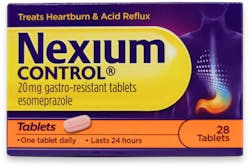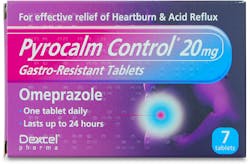Guardium Acid Reflux Control 20mg 7 Tablets
Guardium Acid Reflux Control 20mg 7 Tablets
All sizes
What 500,000+ customers say about medino:
Description
Take these Guardium tablets for long-lasting relief that soothes nagging heartburn and acid reflux – so you can get back to enjoying your favourite meals.
Benefits:
- Acid reflux tablets that actively blocks acid pumps in your stomach, to help soothe the burn
- Provides relief that lasts all day and night
- Soothes and calms painful burning in your chest
- Helps to take care of uncomfortable bloating
- Gets rid of the sour taste in your mouth left by acid reflux
- Just one tablet gives you up to 24hrs of ongoing protection
What symptoms or conditions can be treated with Guardium Acid Reflux Control 20 mg gastro-resistant tablets?
Guardium Acid Reflux Control 20 mg gastro-resistant tablets are used in adults for the short-term treatment of reflux symptoms, such as heartburn and acid regurgitation. Reflux occurs when acid from the stomach flows back into the gullet, which can cause inflammation and pain. It may result in symptoms like a painful sensation in the chest that rises up to the throat (heartburn) and a sour taste in the mouth (acid regurgitation).
What is the active ingredient and how does it work?
The active ingredient in Guardium Acid Reflux Control 20 mg gastro-resistant tablets is esomeprazole, which is a proton pump inhibitor that reduces the amount of acid produced by the stomach. Esomeprazole binds to the enzymes in the stomach that produce acid, thereby reducing the amount of acid that is produced. This medicine is used for the short-term treatment of reflux symptoms in adults, such as heartburn and acid regurgitation caused by the backflow of acid from the stomach into the gullet, which may become inflamed and painful. This medicine is not meant to bring immediate relief and may take 2-3 days to start working.
What is Gastroesophageal Reflux Disease (GERD)?
Gastroesophageal Reflux Disease (GERD) is a condition where stomach acid flows back into the tube connecting the mouth and stomach, also known as the oesophagus. This backwash, also known as acid reflux, can irritate the lining of the oesophagus. Although many people experience acid reflux occasionally, repeated acid reflux can lead to GERD.
What are some common symptoms of GERD?
GERD, or gastroesophageal reflux disease, can present with a range of symptoms. The most common include a burning sensation in the chest after eating, which may be worse at night or when lying down, backwash of food or sour liquid, upper abdominal or chest pain, trouble swallowing, and a sensation of a lump in the throat. Nighttime acid reflux can also cause an ongoing cough, inflammation of the vocal cords (laryngitis), and new or worsening asthma. If you experience any of these symptoms, it is important to seek medical advice to receive an accurate diagnosis and appropriate treatment.
Ingredients
Each Gastro-Resistant Tablets contains 20mg Esomeprazole. Also contains Lactose and Sucrose. See leaflet for further information.
Usage and Instructions
Adults aged 18 years and over:
It might be necessary to take the tablets for 2-3 consecutive days to achieve improvement of symptoms. You should not take this medication for longer than 2 consecutive weeks and you should stop taking it as soon as your symptoms improved.
If no symptom relief is obtained within 2 weeks of continuous treatment, the patient should be instructed to consult a doctor.
Warnings
As with other products which block acid production, you shouldn't take Guardium for longer than 14 days.
Talk to your doctor or pharmacist before taking this medicine if you:
- Have had a stomach ulcer or stomach surgery in the past.
- Have been taking treatment continuously for reflux or heartburn for 4 or more weeks.
- Have jaundice (yellowing of skin or eyes) or severe liver problems.
- Have severe kidney problems.
- Are aged over 55 years old and have new or recently changed reflux symptoms, or need to take a non-prescription indigestion or heartburn remedy treatment every day.
- Have ever had a skin reaction after treatment with a medicine that reduces stomach acid, like this one.
Tell your doctor or our pharmacist immediately before or after taking this medicine, if you notice any of the following symptoms, which could be a sign of another, more serious disease.
- You lose a lot of weight for no reason.
- You have problems or pain when swallowing.
- You get stomach pain or signs of indigestion such as nausea, fullness or bloating, especially after food intake.
- You begin to vomit food or blood, which may appear as dark coffee grounds in your vomit.
- You pass black stools (blood-stained faeces).
- You have severe or persistent diarrhoea; esomeprazole has been associated with a small increased risk of infectious diarrhoea.
- You get a rash on your skin, especially in areas exposed to the sun.Tell your doctor or our pharmacists as soon as you can, as you may need to stop your treatment with this medicine. Remember to also mention any other side-effects like pain in your joints.
Seek urgent medical attention if you experience chest pain with light-headedness, sweating, dizziness or shoulder pain with shortness of breath. This could be a sign of a serious condition with your heart.
Tell your doctor before taking this medicine, if:
- You are due to have an endoscopy or a urea breath test.
- You are due to have a specific blood test (Chromogranin A)If any of the above apply to you (or you are not sure), talk to your doctor straight away.
Children and adolescents: This medicine should not be used by children and adolescents under 18 years of age.
Side Effects
If you notice any of the following serious side effects, stop taking this medicine and contact a doctor immediately:
- Sudden wheezing, swelling of your lips, tongue and throat or body, rash, fainting or difficulties in swallowing (severe allergic reaction).
- Reddening of the skin with blisters or peeling. There may also be severe blisters and bleeding in the lips, eyes, mouth, nose and genitals. This could be ‘Stevens-Johnson syndrome’ or ‘toxic epidermal necrolysis’, which is very rare.
- Yellow skin, dark urine and tiredness, which can be symptoms of liver problems – this is also very rare.
This medicine may (in very rare cases) affect your white blood cells, leading to immune deficiency. If you have an infection with symptoms such as fever, while feeling very under the weather; or fever with symptoms of local infection, such as pain in the neck, throat or mouth or difficulties in urinating, you must consult your doctor as soon as possible so that a lack of white blood cells (agranulocytosis) can be ruled out by a blood test. It's important for you to give information about your medicine when you see the doctor.
Other side effects include:
Common side effects:
- Headache.
- Effects on your stomach or gut: diarrhoea, stomach ache, constipation, wind (flatulence).
- Feeling sick (nausea) or being sick (vomiting).
- Benign polyps in your stomach.
Uncommon side effects:
- Swelling of the feet and ankles.
- Disturbed sleep (insomnia), feeling sleepy.
- Dizziness, tingling feelings such as “pins and needles”.
- Spinning feeling (vertigo).
- Dry mouth.
- Changes in blood tests that check how the liver is working.
- Skin rash, lumpy rash (hives) and itchy skin.







